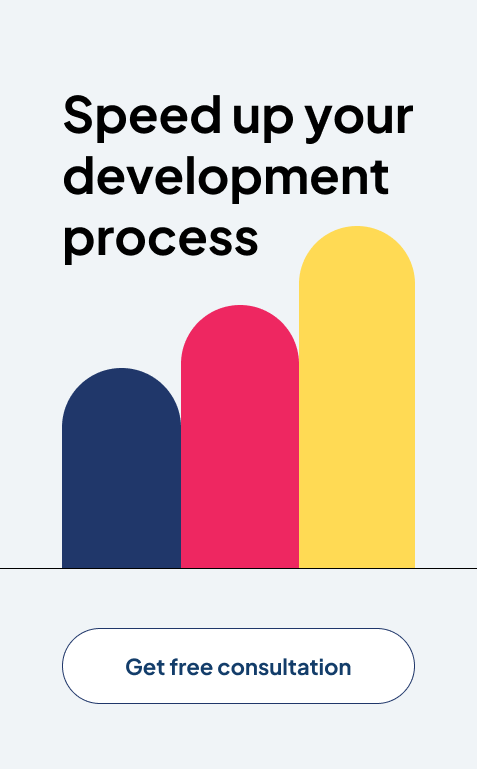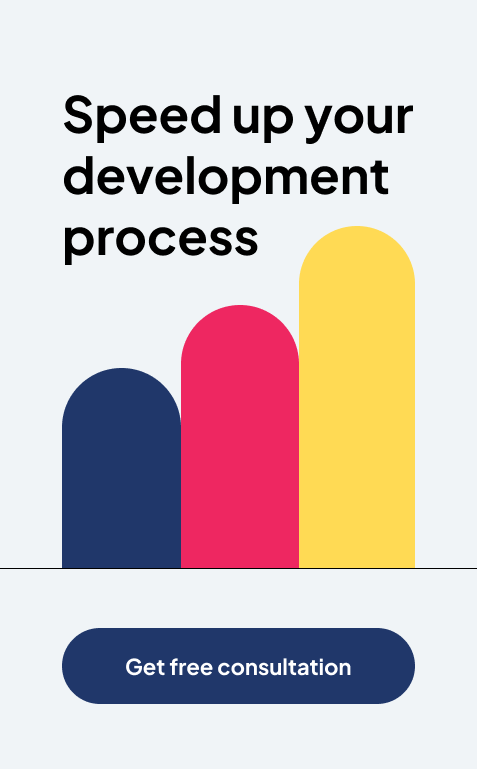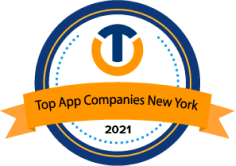MEAN Stack for Mobile App Development: Pros and Cons

Looking to develop a mobile app using the MEAN Stack? Well, you’re in luck! The MEAN Stack development (MongoDB, ExpressJS, AngularJS, and NodeJS) is a powerful and versatile technology stack that has taken the mobile app development world by storm. Over 60% of developers prefer using MEAN Stack for building mobile apps, showcasing its popularity and effectiveness.
In this blog, we’ll delve into the pros and cons, share practical tips, and explore lessons from real-world success stories. Discover how MEAN Stack can be your secret weapon in creating powerful and engaging mobile apps. Let’s get MEAN with mobile app development and embark on a coding adventure!
Understanding MEAN Stack: A Primer
Before diving into the pros and cons, let’s familiarize ourselves with the components of MEAN Stack:
MongoDB:
It’s a powerful NoSQL database that provides flexible data storage capabilities. Its document-oriented model makes it an ideal choice for handling large volumes of unstructured data. MongoDB is highly scalable and can easily handle high traffic and demanding workloads. Plus, its dynamic schema enables developers to add new fields and change data structures on the fly without affecting the database’s performance.
ExpressJS:
It’s a minimalist web application framework that provides a wide range of features and tools to develop robust web applications. ExpressJS simplifies the process of creating and managing server-side logic, making it easier to build scalable and secure web applications. Its middleware architecture allows developers to add functionalities and features to their applications, making them highly customizable.
AngularJS:
It’s a popular front-end framework that simplifies the process of creating dynamic and interactive user interfaces. AngularJS provides a range of tools and features, including data binding, dependency injection, and component-based architecture. Its ability to handle complex data models and manage large data sets makes it a favorite among developers for building responsive and engaging user interfaces.
NodeJS:
It’s a server-side runtime environment that enables developers to use JavaScript for backend development. NodeJS provides a non-blocking I/O model that makes it highly scalable and efficient for handling real-time communication and data-intensive applications. Its rich set of modules and libraries, including NPM, makes it easier for developers to build and deploy web applications.
Together, these four components of the MEAN Stack provide a unified and streamlined development experience for building robust, scalable, and efficient web applications. By using a single programming language, JavaScript, for both front-end and back-end development, developers can save time, effort, and resources in the development process. This unified approach also enables faster iterations, improved debugging, and easier maintenance of web applications.
Now that we have a basic understanding of MEAN Stack, let’s explore its advantages.
Pros of MEAN Stack for Mobile App Development:
Rapid Development with JavaScript:
One of the significant advantages of MEAN Stack is that it utilizes JavaScript throughout the development process. Developers proficient in JavaScript can leverage their existing knowledge to work on both the server and client sides, resulting in faster development cycles and increased productivity.
Full Stack JavaScript Framework:
MEAN Stack provides a comprehensive solution for full-stack development. With JavaScript being the common language, developers can seamlessly switch between different layers of the application, reducing the need to learn multiple programming languages. This results in faster development, streamlined communication, and better code reusability.
Scalability and Flexibility:
MEAN Stack offers excellent scalability and flexibility, making it suitable for projects of various sizes. MongoDB’s schema-less nature allows for easy data manipulation and accommodates evolving requirements. Additionally, Node.js’s non-blocking I/O architecture enables handling multiple concurrent requests efficiently, ensuring smooth performance even under heavy loads.
Real-Time Applications with WebSockets:
MEAN Stack, with its strong integration of Node.js and Angular, facilitates the development of real-time applications. WebSockets enable bidirectional communication between the server and the client, making it ideal for applications requiring instant updates, such as chat apps or collaborative tools.
Robust Database Management with MongoDB:
MongoDB, a popular NoSQL database in the MEAN Stack, offers flexible data storage options. Its document-based approach allows for easy handling of complex data structures and supports horizontal scaling, enabling seamless growth as your user base expands.
Now that we’ve explored the advantages, let’s turn our attention to the potential challenges of using MEAN Stack for mobile app development.
Challenges and Considerations:
Learning Curve for Developers:
While JavaScript expertise is beneficial, developers unfamiliar with MEAN Stack may need time to get up to speed with the intricacies of each component. Learning Express.js, Angular, and MongoDB’s query language require dedicated effort, particularly if you’re transitioning from other frameworks or technologies.
Performance and Scalability Concerns:
While MEAN Stack is highly scalable, it may not be the best fit for all types of applications. When building highly complex applications that require intense computational operations, other frameworks like .NET or Java may provide better performance due to their lower-level capabilities.
Limited Community Support and Resources:
Compared to more established frameworks, MEAN Stack may have a relatively smaller community and fewer resources available. While the community is growing steadily, it’s important to consider the availability of support, libraries, and plugins specific to your project requirements. It’s advisable to evaluate the level of community support and the availability of resources before committing to MEAN Stack for your mobile app development.
Security Considerations:
As with any technology stack, security should be a top priority. MEAN Stack, being an open-source framework, requires diligent attention to security measures. Developers must implement robust authentication and authorization mechanisms, input validation, and secure data handling practices to ensure the protection of user data and prevent potential vulnerabilities.
MEAN Stack Success Stories: Real-World Examples
Now, let’s talk success stories. Uber, the ride-sharing platform, owes part of its success to MEAN Stack. By leveraging MongoDB, ExpressJS, AngularJS, and NodeJS, Uber revolutionized commuting. LinkedIn, the professional networking platform, also relies on MEAN Stack for its mobile app, showcasing its scalability and performance.
Uber:
Uber, the renowned ride-sharing platform, has utilized the MEAN Stack to power its mobile app. The combination of MongoDB for efficient data storage and retrieval, Express.js for building the server-side logic, Angular for the dynamic and interactive user interface, and Node.js for seamless real-time communication has played a crucial role in Uber’s success. MEAN Stack’s scalability and real-time capabilities have enabled Uber to handle a massive volume of concurrent requests, provide accurate location tracking, and deliver a seamless user experience.
LinkedIn:
LinkedIn, the world’s largest professional networking platform, leverages the MEAN Stack to deliver its mobile app experience. With millions of users and extensive features, LinkedIn relies on the MEAN Stack’s versatility and scalability. The combination of MongoDB for storing and managing user profiles, Express.js for handling server-side requests, Angular for creating a responsive and interactive user interface, and Node.js for powering real-time
notifications has helped LinkedIn create a robust mobile app that connects professionals worldwide.
PayPal:
PayPal, a leading online payment platform, has embraced the MEAN Stack for its mobile app development. MEAN Stack’s capabilities have allowed PayPal to handle secure transactions, store user information, and provide a seamless payment experience. MongoDB’s flexible data model has enabled PayPal to manage complex financial data efficiently, while Express.js has facilitated the development of secure APIs and server-side functionalities. Angular has been instrumental in creating a user-friendly interface, and Node.js has ensured fast and scalable communication with the server, making PayPal’s mobile app a trusted and reliable platform for online payments.
These success stories demonstrate how the MEAN Stack can be effectively employed to build high-performance and feature-rich mobile applications. The combination of MongoDB, Express.js, Angular, and Node.js provides a versatile and robust framework that empowers businesses to create scalable, real-time, and user-friendly mobile experiences.
Alternative Frameworks and Technologies:
While MEAN Stack offers numerous advantages for mobile app development, it’s essential to explore alternative frameworks and technologies that might better suit specific project requirements. Here are a few noteworthy options:
MERN Stack:
MERN Stack is an alternative to MEAN Stack that replaces Angular with React.js, a popular JavaScript library for building user interfaces. MERN Stack comprises MongoDB, Express.js, React.js, and Node.js. React.js provides a component-based architecture and offers excellent performance and a vibrant ecosystem. It allows developers to create interactive and dynamic user interfaces with its virtual DOM and extensive community support. It is a great choice for MERN Stack developers who prefer React’s declarative syntax and the ability to build highly scalable applications.
Ionic Framework:
Ionic is a cross-platform framework for building mobile applications using web technologies such as HTML, CSS, and JavaScript. It leverages the power of web development skills and allows developers to create hybrid mobile apps that run smoothly on multiple platforms, including iOS and Android. Ionic provides a rich set of pre-built UI components and plugins, simplifying the development process and enabling the creation of visually appealing and interactive mobile apps. With Ionic, developers can write once and deploy the app across various platforms, saving time and effort in mobile app development.
Flutter:
Flutter is a framework developed by Google for building natively compiled applications for mobile, web, and desktop using a single codebase. Flutter uses Dart, a language specifically designed for building user interfaces, and provides a rich set of pre-built widgets for creating visually stunning and performant applications. Flutter’s hot-reload feature allows for rapid development iterations, enabling developers to see the changes instantly without losing the
app state. Flutter’s cross-platform capabilities, high-performance rendering, and customizable UI elements make it a popular choice for building beautiful and fluid mobile apps.
React Native:
React Native is another cross-platform framework that allows developers to build mobile apps using JavaScript and React. It enables the creation of native-like mobile apps for iOS and Android using a single codebase. React Native utilizes native components, providing high performance and a native look and feel. It offers a vast ecosystem of libraries, tools, and community support, making it a powerful choice for developing cross-platform mobile apps.
When considering alternative frameworks and technologies, it’s crucial to evaluate factors such as performance, platform compatibility, development speed, community support, and the availability of resources and plugins. Each framework has its strengths and focuses on specific use cases. Conducting thorough research and considering the specific needs and goals of your mobile app project will help you make an informed decision and select the most suitable framework or technology.

How Imenso Software Can Help in MEAN Stack for Mobile App Development?
Imenso Software is a leading software development company with expertise in MEAN Stack and mobile app development. Here’s how Imenso Software can help you in MEAN Stack for mobile app development:
Consulting and Requirement Analysis:
Imenso Software offers comprehensive consulting services to understand your business requirements and project goals. Their team of experienced professionals will work closely with you to analyze your needs and provide valuable insights and recommendations for leveraging MEAN Stack in your mobile app development project.
Custom Mobile App Development:
Imenso Software specializes in custom mobile app development using MEAN Stack. They have a dedicated team of MEAN Stack developers who can design and develop high-quality, scalable, and feature-rich mobile applications tailored to your specific requirements. Whether you need a native-like app or a hybrid solution, Imenso Software can deliver top-notch mobile apps that align with your business objectives.
User Experience (UX) and User Interface (UI) Design:
Imenso Software understands the importance of a captivating user experience and visually appealing user interfaces. Their team of designers can create intuitive and engaging UX/UI designs that enhance user interaction and ensure a seamless mobile app experience. They follow best practices in mobile app design, incorporating modern design trends and usability principles.
Quality Assurance and Testing:
Imenso Software emphasizes the importance of quality assurance and testing in the mobile app development process. Their experienced QA professionals perform rigorous testing to identify and address any bugs or issues, ensuring that your mobile app is stable, and reliable, and performs optimally across different devices and platforms.
Ongoing Support and Maintenance:
Imenso Software offers post-development support and maintenance services to ensure that your MEAN Stack mobile app stays up-to-date and functions smoothly. They provide timely updates, bug fixes, and feature enhancements, allowing you to focus on your core business while they take care of the technical aspects of your mobile app.
Project Management and Collaboration:
Imenso Software follows an agile project management approach, keeping you involved throughout the development process. They provide regular updates, conduct meetings, and ensure effective communication to ensure that your project progresses smoothly. Their collaborative approach ensures that your vision is translated into a successful MEAN Stack mobile app.
By leveraging Imenso Software’s expertise in MEAN Stack and mobile app development, you can benefit from their technical proficiency, industry experience, and commitment to delivering high-quality solutions. Whether you have a specific mobile app idea or need assistance in refining your requirements, Imenso Software can be your trusted partner in MEAN Stack mobile app development.
Wrapping it Up:
MEAN Stack offers a powerful ecosystem for mobile app development, leveraging JavaScript across the entire stack. While it brings numerous benefits such as rapid development, scalability, and real-time capabilities, developers should also be aware of the challenges and considerations involved. By exploring real-world success stories, best practices, and alternative frameworks, this blog equips readers with the knowledge to make informed decisions about adopting MEAN Stack for their mobile app projects.
Remember, building successful mobile apps requires a careful evaluation of various factors, including project requirements, team expertise, and long-term goals. Understanding the pros and cons of MEAN Stack empowers developers to harness its potential and create outstanding mobile experiences that captivate users in the ever-evolving digital world.
We’re honored to mention that our efforts have been recognized by renowned B2B review and research platforms such as GoodFirms, Clutch, MirrorView, and many more.
Similar Posts

Top 3 WordPress Development Tools
WordPress developers do most of their work in test environments. If you are a WordPress developer or a company offering WordPress development services, you need an excellent WordPress development tool....

NodeJS Security: Best Practices for Keeping Your Application Safe from Threats
Are you concerned about the security of your Node.js application? Are you aware of the potential risks and vulnerabilities it may face in today’s ever-evolving threat landscape? Protecting your application from malicious attacks and unauthorized access is crucial to safeguarding sensitive data and maintaining user trust. But where do you begin? In a world where […]...

Best Software Development Services in India: 10 Tips You Need to Follow
Are you looking for the best offshore software development services? Stay along! Software is frequently misunderstood as simply technology, but it is much more. Of course, it is technology, but it is also an intuitive and conscious art. High-quality and reliable software is the foundation of any business, regardless of its size or scope of […]...








